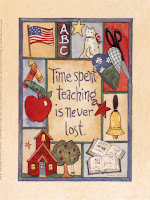Left to their own devices, my boys, aged 10 and 7, would grunt hello in the morning, leave their pants of the floor for me to pick up, and command me to fix them a snack when they were hungry. I find these behaviors rude and appalling and work very hard to correct these obnoxious habits. When they bark orders, I remind them to say please and thank you. In spite of their angry protests, I make them clean up the bits of construction paper they sprayed all over the floor in the great confetti experiment. They are responsible for putting their clothes in the hamper and their dirty dishes in the sink and as a result, people often tell me how polite and pleasant my boys are. I am always flattered and hear myself saying, “yes, they are such good boys,” as if their affability were innate and had nothing to do with me at all.
I recently visited a first grade classroom and modeled a lesson about how to help children recognize words they don’t know in their reading. Following the lesson, the six year olds in this class grabbed their book baggies, found their cozy spot in the classroom, and read for fifteen minutes. There was a quiet buzz in the classroom as children spoke softly into their whisper phones or shared something too good to be missed with a friend sitting near them. The tenor of this independent reading period was focused and productive. When I complemented the teacher on the efficacy of her reading workshop, she smiled and said, “It’s because I have such a good group this year.”
It surprised me to hear her say this. Implied in her comment was the notion that what I saw might not be possible with a different group of students. In the same way that I attribute my own children’s pleasantries to something they were born with, she saw her success as a workshop teacher as dependent upon her students. I quickly reminded her that while it’s always nice to work with a “good group,” our successes as educators are directly linked to what we know about best practice and the daily decisions we make about how to implement this knowledge. While “a good group” might facilitate implementation, what I saw was directly linked to good teaching.
As educators, we need to think hard about educational responsibility. When things go well, it is not just because our students are “smart” or “working really hard.” It’s because we are doing something right as teachers. In the same sense, when things are not going well, it’s not just because children are “difficult” or “come from poor homes” or “distractible.” It’s because we need to do something different to reach those students. While it is easy, and arguably natural, to attribute both positive and negative learning outcomes to children, there is really but one direction to point the finger for the success and failure of our students: at ourselves. What students learn and how well they learn is dictated by the quality of the person delivering the instruction: children’s educations are our responsibility. The more we know, the better we teach. The better we teach, the better they learn.

